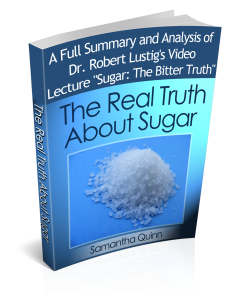Dr. Robert Lustig’s video lecture “Sugar: The Bitter Truth” makes it clear that fructose, which makes up half of ordinary table sugar as well as half of the much-demonized high fructose corn syrup (HFCS), is a toxin that can cause serious health problems. What’s less known is that fructose can also be responsible for overeating. Sugar and overeating, as it turns out, are biochemically related.
The reason for this is that fructose does not stimulate insulin, which is the hormone that regulates the amount of glucose in the blood. This is important because our brain sees raised insulin levels as a sign that the body has eaten and can now stop eating. Without this signal, we don’t feel as if we have eaten anything. The natural feedback system that exists between the liver, the pancreas (the gland that secretes pancreatic juices for digestion into the intestines and insulin into the bloodstream) and the brain is thrown into imbalance because the consumption of fructose has not been recognized.
In other words, insulin is the way our body has of lowering glucose (blood sugar) levels. When we consume large amounts of fructose and insulin is not secreted, it’s as if we don’t know we have eaten. We still feel hungry and want to eat until we feel that “I have eaten enough” signal. That is why sugar and overeating so often go together.
This situation is compounded by several factors. The first is that sugar consumption (and therefore fructose consumption) is at an all-time high. Read the labels on your food packaging, and you will see that this is true. Sugar is in everything these days.
Why so much sugar? Two reasons: high fructose corn syrup is extremely cheap, and sugar is used to mask the bad taste of processed foods—especially nonfat or low-fat foods. Sugar is also used in soft drink products to cover the high sodium content added to make you feel thirsty.
What this means is that the classic fast food meal that includes a large soft drink is a real sneak attack on your body’s attempts to regulate your food intake. Your body won’t even register all the fructose in the soft drink. What’s more, because there is virtually no fiber in a fast food meal, the signal of satisfaction you are looking for will be delayed because it is fiber that moves more quickly through your digestive system to send this signal.
Weight gain is the direct consequence of overeating. In fact, Dr. Lustig estimates that one 12 oz. can of soda per day equals 15 pounds of fat per year. This is because a high-sugar diet turns out to be a high fat diet due to the way that fructose is metabolized through the liver in our body. Sugar and overeating often start with a regular diet of soda or soft drinks.
The consequences of a high-sugar diet are much more than weight gain, however. When we essentially don’t know that we have eaten, we will probably continue to consume more carbohydrates and fructose, which will lead to greater insulin resistance, more fat production, and a vicious cycle of consumption and disease. Dr. Lustig asserts that chronic fructose consumption can cause hypertension, inflammation, obesity and metabolic syndrome—perhaps even cancer.
What can be done? Reduce or eliminate your sugar intake—especially your consumption of sweetened beverages. Eat more fiber. Exercise to increase your metabolism.
Become informed. Read my ebook, The Real Truth About Sugar, and watch Dr. Lustig’s video “Sugar: The Bitter Truth.”
You deserve to know the truth about sugar.






What sweetners do not have fructose in them. What sweetners are safe to use in cooking or more clearly stated what swetners would you reccomend to your children. My Wife Jodi and our twins Sean & Ryan 9 years old are vegan and a third boy Alan is 6 years old and not vegan looking for sound advice on sweetners? Affter watching the video and reading the book “The Real Truth About Sugar” on sugar & high fructose corn syrup we want to know if Truvie is a sweetner you would give your kids if they have type 2 dibetes? Where can we find credible information on all the sweetners on the market so we can purge processed foods that have sweetners in them?
Thanks for the great questions, Scott. I can’t speak to your question about Truvia and type 2 diabetes, but I will tell you that I follow the advice of the scientists I have researched: and that is to eliminate sweeteners from my diet as much as possible. For me, this means that I eat fruit (it also contains lots of fiber, etc.) and will occasionally eat something that is sweetened. As far as what is safe (and vegan), I suggest that you look into barley malt syrup or brown rice syrup. Neither has fructose, and they’ve been in the human diet for millennia. I know it’s difficult to buy prepared foods without sweeteners, but it is possible. And in the long run, it’s really worth the effort.